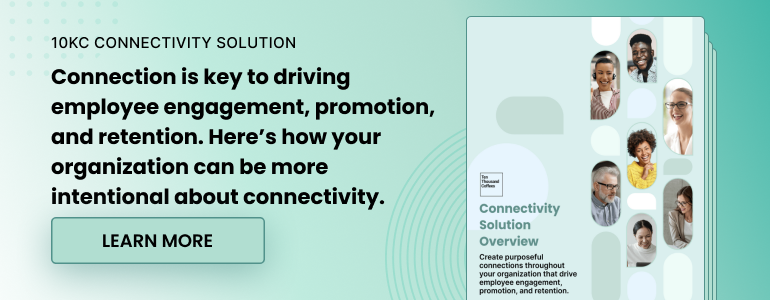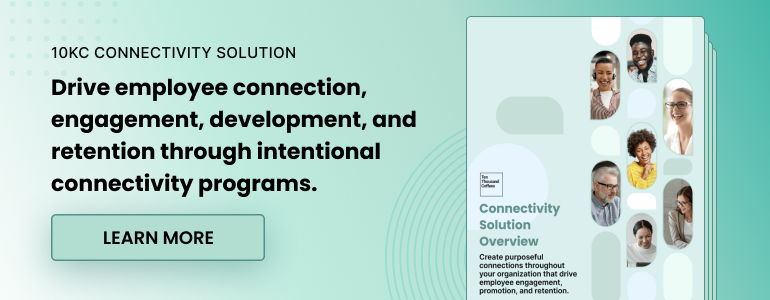“Networking is important.”
You and probably every single one of your employees has heard (or been told this) at some point in your career. And while networking is important, the pressure we put on building our networks can make creating meaningful connections both challenging and scary.
As an employer, there are many ways you can promote employee connectivity while making it easier and more effective. From networking activity ideas to coffee chat questions, keep reading as we explore some of the best ways to boost connection and employee networks in the workplace.
What is employee networking?
Employee networking is any activity that promotes interpersonal professional relationships between employees.
The goal of employee networking is to connect individuals with their peers and colleagues so that they can lean on each other for support, opportunities, and professional development.
The importance of employee networking for workplace connection
Employee networking is key to driving employee professional growth. It’s likely why 60% of employees are actively looking for opportunities to be better connected to their peers.
And it’s not just about career development. When employees have networks and feel connected to their peers:
- They perform better at their roles. An employee's network is a 5x better predictor of performance than personality, experience, cognitive ability, and education combined.
- They are more likely to stay at your organization: A sense of belonging increases retention by 34%.
- They are more satisfied with their jobs: The American Psychological Association says that connection and community make for happier and healthier employees.
6 employee networking activities to boost connection
We often think about employee networking as a large room full of strangers introducing themselves to each other.
While that technically is a form of networking, there are many more thoughtful activities that you use to build employee networks.
1. Interest-based networking events: These types of networking events bring together people under a common umbrella. It provides an anchor that makes it easier for people to connect with one another. For example, this could include industry-specific networking or even hobby-based networking events.
2. Speed networking: Think speed dating but for finding a mentor and expanding your network. Speed networking offers a bit more structure and provides an opportunity for employees to meet a large number of new people in a limited amount of time.
3. Workshops: These are typically learning and development opportunities that either include networking activities or opportunities to connect before, during, or after the core learning activity. By centering networking around a purpose, it can bring together employees of similar interests and goals.
4. Round table discussions: These are smaller-format networking activities that allow employees and subject matter experts to come together and connect on initiatives or goals. Round table discussions are a great way to increase the visibility of employees among busy senior leaders.
5. Mentoring opportunities: Mentorship programs connect employees with peers and senior leaders to help expand their networks and progress in their careers.
6. Coffee chats: Connecting employees for coffee chat opportunities is an easy, informal way to help employees expand their networks.
What is a coffee chat?
A coffee chat is an informal meeting between two (or sometimes more) individuals. They’re a great way to build connections in a professional but lower-stakes environment.
Coffee chats can make networking and meeting new people a lot more accessible.
Think about it this way. Consider having a conversation over a cup of coffee. Now consider the exact same conversation happening in a boardroom. Which one is likely to feel more comfortable?
But of course, coffee chats don’t have to be over coffee. It’s really become a catch-all name for informal conversations, networking, or even mentorship. And in a remote or hybrid environment, it’s not uncommon to see coffee chats happen virtually.
Benefits of coffee chats for employee connection
When approached like a strategic initiative, coffee chats can actually make a meaningful impact toward driving mentorship, teamwork, and productivity.
1. Coffee chats reduce barriers to formal networking
For early talent or even more introverted employees, networking in the way we know it can be extremely stressful and overwhelming. This can discourage employees from networking altogether.
Having coffee with a colleague still encourages expanding networks but removes the pressures that come with formal networking.
"When we think about networking and mentoring, we always go back to being stuck in this giant networking hall, where we have to run around with a coffee or cocktail in hand and try to meet as many people as we can — that's terrifying for people who are more introverted, and one of the great things with technology is that online, you don’t need those skills to work a room.” - Mark Beckles, Vice-President, Social Impact and Innovation at RBC
2. Coffee chats promote knowledge-sharing
Whether having a coffee chat with a peer or a senior leader, coffee chats encourage employees to share ideas and perspectives. This can include their own personal or professional experiences and expertise. This is especially true in the context of mentorship.
Whether it’s sharing best practices or nuggets of wisdom, knowledge sharing can help everyone in the organization grow.
3. Coffee chats encourage collaboration
Coffee chats often bring together employees who don’t work together on a daily basis. This type of informal connection makes collaboration more comfortable. For example, if an employee has had a positive coffee chat with an employee in another department, they’re much more likely to reach out if they need their help in the future.
4. Coffee chats boost future employee opportunities
Coffee chats—like most mentoring and networking opportunities—help employees identify future opportunities. It can also connect them with leaders or other employees who are likely to consider or recommend them for future opportunities. With up to 80% of all jobs hired through personal networks, coffee chats can play a major role in an employee’s career development.
5. Coffee chats elevate employee engagement
Coffee chats encourage employee engagement in two ways.
First, it provides a forum for employees to connect with other employees in a setting adjacent to their work—which can boost performance and provide a sense of loyalty.
And by connecting employees with their peers, coffee chats also provide a sense of belonging and camaraderie that is connected to employee engagement and job satisfaction.

How to create an employee networking and coffee chat program
The thing about networking is that it’s happening in the workplace, regardless of if you have a formal program in place. But informal networking is prone to affinity bias and other inequities that can leave many employees—particularly those from diverse and underrepresented backgrounds—behind.
Creating an employee networking program and facilitating intentional coffee chats ensures that all employees have equitable access to opportunities to connect and engage with their peers.
So let’s go through some of the basic steps for creating an employee networking and coffee chat program:
- Identify your employee networking goals. What would you like to be the key outcomes for your networking and coffee chat initiatives?
- Determine who are the key stakeholders. Who should be consulted and who is accountable for the outcomes?
- Decide on networking activities and initiatives. In addition to 1:1 meetings and coffee chats, How else will you encourage networking and connection?
- Onboard tools to implement employee networking at scale. What tools can help you deploy coffee chats and networking opportunities at scale?
- Measure outcomes and collect employee feedback. Are employees making the most of the program? Are you seeing the results you expected? And how can you optimize the program going forward?
%25252520copy.png)
15 coffee chat questions to drive better connections and mentoring
Coffee chats between people who aren’t entirely familiar with one another can be awkward. People are often nervous about filling dead air. By providing mentors and mentees with discussion guides and conversation starters for ongoing sessions, you can increase the value of these conversations and help employees avoid the awkward silence.
Here is a collection of coffee chat questions that you can include in your networking and mentorship curriculums to help employees approach their coffee chats with confidence.
Questions about work history and personal development
To help employees connect and reach professional goals, mentors and mentees should have a solid understanding of each other's professional background. Asking questions about personal work history can help encourage self-reflection and give context for more specific questions down the line.
1. How did you get started in your career at this company?
Whether someone’s been at a company for one month or 10 years, it’s helpful for mentors and mentees to share how they got there.
For example, some people work for years to join their dream company or industry. Many others stumble upon their current career path by chance. Both paths are equally valuable and asking this question can help understand how someone got to where they are today.
2. Tell me a little bit about your professional background.
Mentors and mentees both have professional experiences that extend beyond your company.
This question gives mentors and mentees a bit more context behind their goals and experiences. It's valuable for understanding their current position, skill set, and goals.
3. What’s been one of your most positive professional experiences–in this company or in a role at another organization?
This question gives employees the opportunity to dive deeper into what makes their conversation partner feel accomplished and fulfilled. Not only does this provide insight into someone’s accomplishments but can help them understand what motivates and fulfills them.
Personal questions
Coffee chats shouldn’t be exclusively reserved for career discussions. Going beyond work can help break the ice, make both parties feel more valued, and create a more enjoyable interaction.
These personal questions can help lead to a more productive coffee chat and mentor-mentee relationship.
4. How are you doing?
Seems obvious right? But when in a new or nerve-wracking situation it’s easy to forget the basics. So don’t be afraid to include the obvious questions in your mentoring prompts or conversation starters.
Small talk and simple questions can go a long way in both parties showing that they value each other as people, outside of their professional growth. And let’s face it, sometimes it’s just nice to have someone ask you how you’re doing.
5. How is your family?
Expressing interest in the wellbeing of someone’s loved ones acknowledges the things that are important to them outside of their work. While no one should pry too hard, asking questions about someone’s friends and family can help set the other person at ease, knowing they can feel comfortable sharing—if they so choose.
6. What do you do for fun?
Someone’s hobbies and interests beyond work are a part of who they are. Inviting someone to share about their non-work-related activities not only makes the conversation more fun but also provides insight into their personality. They also offer an opening to find common ground on something outside of work and career goals.
Problem-solving questions
Along with boosting connection, the goal of a networking coffee chat or mentoring conversation is to help the mentee progress in their careers. This means facing any hurdles, areas of conflict, or barriers straight on.
Use these questions to help identify those challenges, so mentors and mentees can tackle them together.
7. What hurdles are you facing right now in your job?
This open-ended question gives mentees an opportunity to share any challenges they’re facing in their current role. For example, this could be a lack of time or resources, poor communication about a particular project, a difficult client, or a general feeling of stagnancy in their position.
This is a great way to identify areas of growth and opportunity.
8. How are your relationships to your colleagues and to leadership?
This can be a tricky area to address but it’s an important one. Encouraging mentors to ask about their mentee’s relationships in the workplace can be key to understanding the barriers they’re experiencing in their role.
When employees don’t feel connected to their colleagues, it not only decreases employee satisfaction but their own ability to be productive and reach their career goals.
9. Do you have any other concerns that you’d like to chat about?
Questions like this can feel vague, but they’re valuable in giving employees an opportunity to share what’s on their minds. Maybe they’re experiencing personal challenges or a fear about an upcoming work deadline.
Everyone has different hurdles to overcome and they can significantly impact their ability to thrive in the workplace. So even if there’s nothing that comes up immediately, questions like this help emphasize that a mentor is ready and willing to listen.
WATCH NOW: Mentorship: The Ultimate Tool for Employee Engagement and Development
Questions about goal setting
Goal setting is a critical piece of the mentorship process. While coffee chats can be informal and fun, goal-setting questions keep conversations on track and put a plan in place so everyone can make the most of their mentoring relationship.
10. Where do you see yourself in one year?
Looking one year down the road helps mentors and mentees think through short-term goals. Perhaps it’s developing a new skill set or launching a new project.
This then encourages them to work backward and set milestones that lead up to that goal.
11. Where do you see yourself in five years?
Of course, one-year goals should also ladder up to longer-term goals. Five years is often a great timeline to kickstart the conversation without feeling too abstract.
This question can help unlock some of the bigger-picture objectives that mentees might have. They might want to become a leader in the organization or add certain experiences to their professional portfolio.
Identifying these bigger goals can help shape their short-term goals, so they can get one step closer to those big goals.
12. What are some personal goals you’d like to work on?
Mentor and mentee relationships can—and should—go beyond the work world. Mentors have the opportunity to help their mentees grow as professionals and human beings.
Mentees may have personal goals that they’d like to work on and mentees can often provide valuable insight. For example, someone might want to improve their focus, their public speaking skills, or self-discipline—all of which can be improved through mentoring.
Questions about strategy
Finally, make sure that your mentors and mentees have discussions around strategy.
Use these questions to encourage action-oriented coffee chats.
13. What are you going to do this week to improve at ______?
This is a great question that can be used in every coffee chat conversation. It circles back to one of the goals outlined earlier and makes sure actions are being taken to reach them.
It also makes sure that mentors and mentees leave every coffee chat with an action item
14. Are there any hurdles that may prevent you from achieving your goals?
Reaching your goals isn’t always smooth sailing. By checking in on challenges, mentors can help mentees problem-solve sooner rather than later.
15. How can I help you grow in your career?
For mentees to make the most of their relationship, encourage mentors to ask their mentees how they can best help them. Whether it’s by providing feedback on work or introducing them to their network, this ensures mentors can do their part to truly support their mentees.

How to create better coffee chat experiences with 10KC
Coffee chats and mentoring conversations go beyond asking the right questions. 10KC’s inclusive mentoring and networking platform is designed to help your organization build networks and relationships that drive growth, engagement, and retention.
10KC helps increase employee connection by:
- Making employee connection an experience: Send networking opportunities directly to employees’ inboxes, so meaningful connections are just a click away.
- Creating unbiased matches at scale: Automatically match employees 1:1 based on their career goals, shared interests, or differences—no spreadsheets needed.
- Measuring participation and outcomes: Structured curriculums and data dashboards help you measure the value of every conversation—and tie that value back to your talent goals.
.png)









.png)